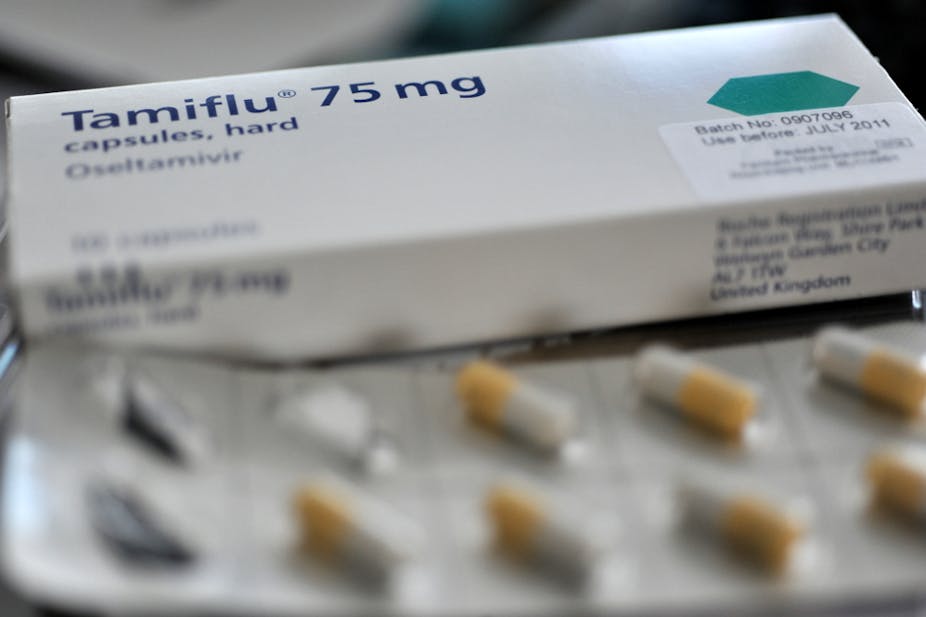Antiviral drugs are largely ineffective for reducing hospital admissions and complications from influenza, and come with serious side-effects, according to a research review published by the Cochrane Collaboration today.
The drugs were stockpiled by governments across the world, including Australia’s, in response to the 2009 swine flu pandemic.
Cochrane, along with the British Medical Journal, is asking governments to consider whether they would choose to stockpile well-known antiviral Tamiflu in light of these findings, arguing the original evidence leading to the stockpiling was incomplete.
A spokeswoman for the Federal Department of Health said antivirals were part of the National Medical Stockpile currently valued at A$192 million, but refused to provide further details “due to security and commercial sensitivities”.
The US spent more than US$1.3 billion buying a strategic reserve of the antivirals, while the UK government has spent almost ₤424 million for its stockpile of 40 million doses.
Cochrane has been reviewing the effectiveness of Tamiflu since 2005. It updated its previous reviews of Tamiflu (oseltamivir) and Relenza (zanamivir) in 2009 with funding from the UK and Australian governments, to determine the effectiveness of the drugs in light of their sudden popularity. Feedback on that review led to requests for unpublished data from drug manufacturers, Roche and GSK, which was only fully handed over last year.
This latest review incorporates hundreds of pages of data in the form of clinical study reports, which contain all the information about a clinical trial, from over 50 trials encompassing over 24,000 people, said professor of public health, Chris del Mar, who was one of the Cochrane reviewers.
The review found Tamiflu and Relenza have serious side-effects including nausea and vomiting, as well as increased risk of headaches, psychiatric disturbances and kidney problems.
“We were able to show that, as previously found, these neuraminidase inhibitors do reduce symptoms, but that they shorten the illness by about half a day, by hours rather than days,” del Mar said. “There’s a chance that people feel better from this drug and get around spreading the virus, exactly the kind of behaviour you don’t want in a pandemic.”
Ian Barr, deputy director of the WHO Collaborating Centre for Reference and Research in Influenza, said a pandemic could happen at any time, but that they were irregular events and there could be quite long gaps between them.
“There’s an expectation that pandemics have a level of severity and what we got in 2009 was quite a mild virus although there were still thousands of people who ended up dying,” Barr added.
The department of health spokeswoman did not to respond to a question about whether the government would reconsider stockpiling the antivirals in light of today’s publication, but she said it was currently revising its pandemic plan. One of the points under consideration was the aim of antiviral use for reducing the severity of illness and risk of infection, she said.
Chris del Mar said other options for pandemic preparedness included the use of barriers such a masks, gloves and gowns and preparing hospitals to triage people who may arrive in large numbers in case of a pandemic. This approach would work in other acute respiratory viral epidemics such as SARS and MERS.
Barr said depending on when people were treated, it was possible to reduce levels of virus to stop transmission a little, but it wouldn’t stop all transmission.
“If you’re going to stockpile, the question is how much you stockpile. I’m not an advocate for stockpiling huge amounts of drug in a warehouse somewhere in the country and even if something does happen you’ve got a logistical nightmare of getting things out to people in sufficient time. I think small stockpiles make good sense, distributed throughout the country.
"Governments should always carefully consider available drugs and what their potential applications and pros and cons of stroring them are. I think you can always justify a small stockpile but for large stockpiles you have to look carefully at the pros and cons.”
The review comes days after Australian researchers published research in the journal PLOS Pathogens warning against depending on Tamiflu in a pandemic as the swine flu virus is one mutation away from being resistant to the drug.

